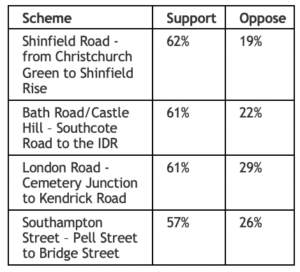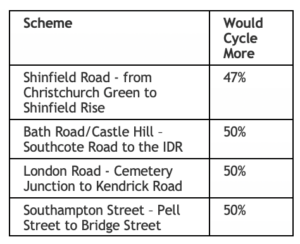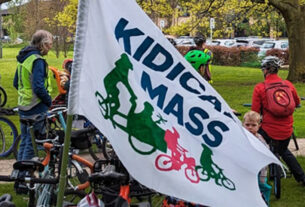Christchurch Bridge – Berkeley Appeal Planning Rejection
Berkeley Homes’ proposed redevelopment of the former SSE site off Vastern Road was seen as a ‘missed opportunity’ to provide a quality southern connection from Christchurch Bridge to Vastern Road.
In March this year RBC refused the planning application as it did not meet the requirements set out by the Council for this important active travel corridor. Berkeley Homes has appealed this decision; let’s hope the Planning Inspectorate also think that sustainable travel should be a material factor in planning decisions.
New Segregated Cycle Facilities, And The Winner Is… Shinfield Road
At the end of 2020 RBC was awarded £1.2 million through the Department for Transport’s Active Travel Fund to support the implementation of walking and cycling schemes in the borough.
The Council undertook consultation on concept plans for four schemes which asked a number of questions on each of the individual schemes. In terms of supporting or opposing segregated cycle lanes (this being the major element of each scheme) the results broke down as follows:

Based on the above the Council decided at the Strategic Environment Planning and Transport committee meeting in June that it will progress the Shinfield Road Scheme as it had the most support and least opposition.
RCC responded to the consultation with our opinion the schemes which connect with the town centre (i.e. Bath Road/Castle Hill and Southampton Street) are likely to have a greater impact on encouraging more bike journeys, with the Bath Road scheme top of our list.
In fact the consultation asked a myriad of questions which can be sliced and diced in a number of ways. In terms of which schemes would encourage people to cycle more often the results were as follows:
 In terms of individual elements of the overall schemes (segregated cycle lanes being one element) the most strongly supported element (at 72% support) was improved crossing facilities both at Cemetery Junction and at the Oracle roundabout.
In terms of individual elements of the overall schemes (segregated cycle lanes being one element) the most strongly supported element (at 72% support) was improved crossing facilities both at Cemetery Junction and at the Oracle roundabout.
So, in terms of encouraging cycling, Shinfield Road was the least favourable scheme!
What is evident from the consultation is that for all the schemes far more people support them than oppose them; even where that involves reallocation of road space from motor vehicles.
All of the schemes need implementing and we have heard that RBC has received indication that it will be allocated further Active Travel Fund money and that this will be used to fund the Bath Road/Castle Hill scheme.
According to the Council detailed design for Shinfield Road is now underway with implementation scheduled from Spring 2022 onwards. Our challenge to the Council is not to let this timetable slip.
A Reading Cycle Hub
Reading Borough Council has been awarded £0.25m from the Active Travel Capability Fund. The Council’s plan is to use this for the development of a town centre cycle hub, offering secure cycle parking, cycle maintenance and a cycle loan/donation scheme.
Such cycle hubs have popped up in other towns and cities and can take several forms, but generally they need to be staffed to be successful.
The challenge will be to establish a cycle hub that has a funding mechanism which allows it to be self-sustaining in the long term – we know what happened to Reading’s cycle hire scheme, which folded after the initial funding ran out.
Ethical Reading has been pushing to establish a cycle hub in the town and has had initial discussions with the Council on opportunities and viability.
Local Transport Plan Gathers Moss
Reading’s Local Transport Plan (LTP) to 2036 is still in draft over a year since the consultation period ended. The Council’s current intention is to pause further work on the LTP in order to establish a new baseline in 2022/23.
At the Strategic Environment Planning and Transport committee meeting in June it was announced that the Council would undertake “the development of detailed LTP sub-strategies …alongside monitoring of the new normal to inform an update of the draft LTP to commence later in the year. This will require at least a year to understand how workplace and shopping habits have changed …”
The draft LTP proposed demand management measures to help a modal shift to more sustainable transport. The draft LTP did not contain firm proposals for demand management but stated that the Council was investigating options including Workplace Parking Levy, Road User Charging, Clean Air Zone and Emissions Based Charging.
From the Council meeting in June there is now a hint that the Council is getting cold feet on demand management.
The draft LTP also proposed to create a network of Strategic and Local Cycle Routes, but the timetable for these is now in doubt.
The delay in adopting the LTP is attributed to the change in travel habits due to the COVID pandemic. However, the reduction in traffic in the early days of COVID is clearly over – did anyone mention a climate crisis?
Keith Elliott
RCC Secretary



